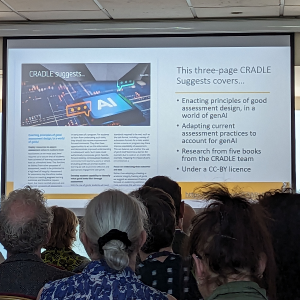Recently, our Professional Development Projects Specialist, Hannah Williams, attended the annual Assessment in Higher Education conference (AHE) in Manchester. Taking place on the 22nd-23rd June this event brought together educators, professionals, and experts from various fields to explore the evolving landscape of assessments in higher education.
In this blog post, we'll delve into some of Hannah's top takeaways from the conference, focusing on five key themes that emerged: generative AI and its impact on assessments, the importance of feedback, the need for authentic assessments, the pursuit of inclusion and social justice in education, bridging the assessment literacy gap between Students and Staff.
Generative AI: a paradigm shift in assessments
The rise of generative AI poses both challenges and opportunities for assessments. AI technology has the potential to revolutionise the way we evaluate student abilities in various subjects. We should view AI, including chat-based models like ChatGPT, through a validity lens. By addressing concerns about validity and incorporating AI tools into assessment design, we can create fair, reliable, and meaningful assessments. It's essential to focus on reforming the assessment process to adapt to this evolving technology while maintaining the integrity of evaluations.
Feedback: from information to process
Traditionally, feedback has been seen as providing information to students. However, the focus is now shifting towards developing students' feedback literacy and considering feedback as a process. This involves enabling students to engage with, interpret, critically evaluate, and utilise feedback effectively.
The integration of automated outputs and AI technologies in the feedback process requires students to develop their capacity for critical engagement. Through appropriate prompts, ongoing dialogue, and reflection, students can maximize the benefits of feedback to enhance their learning and thinking.
Authentic Assessments: joining academia and the workplace
To better prepare students for the post-university world, assessments need to mirror real-world applications beyond academia. While academic assessments emphasize theory and critical thinking, professional assignments can require more creativity and practicality.
The concept of the 'unessay' was introduced as a unique project idea allowing students to showcase their knowledge and creativity through various mediums of their own choosing. By embracing authentic assessments, educators can provide students with opportunities to explore topics of interest and develop skills that align with their future career paths and aims.
Inclusion and social justice: making education equitable for all
The pursuit of inclusion and social justice remains a crucial challenge in higher education. There are still huge attainment gaps among marginalized groups, including BAME, women, LGBTQ+, disabled, and neurodivergent students. While progress has been made, the COVID-19 disruption further highlighted the need for a fair and equitable education system.
The current assessment model, often centred around time-pressured exams, can perpetuate feelings of "othering" for students who require accommodations. Universal Design for Learning and alternative assessment approaches offer potential solutions to create a more inclusive and supportive educational environment.
Assessment Literacy: bridging the gap between students and staff
Assessment literacy is a crucial aspect of education that bridges the gap between students and staff. At the AHE conference, there were discussions around the disparity in assessment literacy levels, highlighting the need for improvement.
Students must grasp key command words and understand how to respond to assessment questions effectively to showcase their critical thinking abilities. Simultaneously, staff members must enhance their assessment literacy to design accessible and precise assessment briefs. Overcoming resistance to change among staff is also essential to foster a culture that embraces innovative assessment practices. By addressing these challenges, we can create a more cohesive and effective assessment ecosystem that empowers students and supports their academic growth.

“The Assessment in Higher Education Conference 2023 was a fantastic opportunity to spend a couple of days immersed in the latest research and progress in the HE assessment world,” said Hannah.
“Developments in HE as a result of the COVID-19 pandemic, as well as the forthcoming rapid advancements in generative AI and technology make this such an exciting and pivotal moment in this sector. I’ve come away with so many new thoughts and ideas as to what we at the Cambridge Assessment Network can do to support HE assessment professionals with the challenges they face moving forward and am particularly enthusiastic about what we can do to make assessments equitable for everyone.”
Below you can find links to particular books, articles and ongoing projects that were highlighted during the conference: